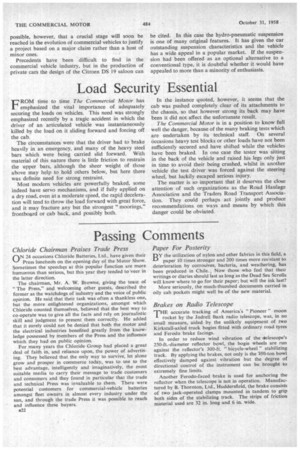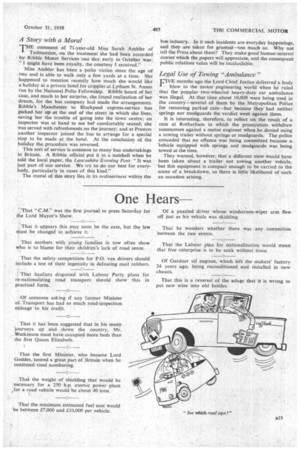Passing Comments
Page 26

Page 27

If you've noticed an error in this article please click here to report it so we can fix it.
Chloride Chairman Praises Trade Press
nN 24 occasions Chloride Batteries, Ltd., have given their Press lunchedn on the opening day of the Motor Show. Sometimes the speeches at this popular function are more humorous than serious, but this year they tended to veer in the latter direction.
The chairman, Mr. A. W. Browne; giving the toast of "The Press," and welcoming other guests, described the former as the watchdogs of industry and the voice of public opinion. He said that their task was often a thankless one, but the more enlightened organizations, amongst which Chloride counted themselves, believed that the best way to co-operate was to give all the facts and rely on journalistic skill and judgment to present them correctly. He added that it surely could not be denied that both the motor and the electrical industries benefited greatly from the knowledge possessed by members of the Press and the influence which they had on public opinion.
For many years the Chloride Group had placed a great deal of faith in, and reliance upon, the power of advertising. They believed that the only way to survive, let alone grow and prosper in commerce today, was to use to the best advantage, intelligently and imaginatively, the most suitable media to carry their message to trade customers and consumers and they found in particular that the trade and technical Press was invaluable to them. There were potential customers for commercial-vehicle batteries amongst fleet owners in almost every industry under the sun, and through the trade Press it was possible to reach and influence these buyers.
B22
Paper For Posterity
By the utilization of nylon and other fabrics in this field, a paper 10 times stronger and 200 times more res;stant to deterioration by corrosives, bacteria, and weathering, has been produced in Chile. Now those who feel that their writings or diaries should last as long as the Dead Sea Scrolls will know where to go for their paper; but will the ink last?
More seriously, the much-thumbed documents carried in oily cab pockets might well be of the new material.
Brakes on Radio Telescope
THE accurate tracking of America's " Pioneer " moon I rocket by the Jodrell Bank radio telescope, was, in no small measure, aided by the unlikely equipment of two Kirkstall-axled truck bogies fitted with ordinary road tyres and Ferodo brake facings.
In order to reduce wind vibration of the -telescope's 250-ft.-diameter reflector bowl, the bogie wheels are run against the reflector's 300-ft. " bicycle-wheel " stabilizing track. By applying the brakes, not only is the 7.50-ton bowl effectively damped against vibration but the degree of directional control of the instrument can be brought to extremely fine limits.
Another Ferodo-faced brake is used for anchoring the reflector when the telescope is not in operation. Manufactured by B. Thornton, Ltd., Huddersfield, the brake consists of two jack-operated clamps mounted in tandem to grip both sides of the stabilizing track. The strips of friction material used are 32 in. long and 6 in. wide.
A Story with a Moral
THE comment of 71-year-old Miss Sarah Ambler of Todmorden, on the treatment she had been accorded byRibble Motor Services one day, early inOctober was: "I might have been royalty, the courtesy I received."
Miss Ambler has been a polio victim since the age of two and is able to walk only a few yards at a time. She happened to mention recently how much she would like a holiday at a private hotel for cripples at Lytham St. Annes run by the National Polio Fellowship. Ribble heard of her case, and much to her surprise, she found realization of her dream, for the bus company had made the arrangements. Ribble's Manchester to Blackpool express-service bus picked her up at the end of the street in which she lives, saving her the trouble of going into the town centre; an inspector was at hand to see het comfortably seated; she was served with refreshments on the journey; and at Preston another inspector joined the bus to arrange for a special stop to be made at the hotel. At the conclusion of the holiday the procedure was reversed.
This sort of service is common to many bus undertakings in Britain. A Ribble official put it in a nutshell when he told the local paper, the Lancashire Evening Post: "It was just part of our service. We try to do our best for everybody, particularly in cases of this kind."
The moral of this story lies in its ordinariness' within the bus industry. In it such incidents are everyday happenings, and they are taken for granted—too much so. Why not tell the Press about them? They make good human-interest stories which the papers will appreciate, and the consequent public relations value will be incalculable.
Legal Use of Towing "Ambulance.), FIVE months ago the Lord Chief Justice delivered a body blow to the motor engineering world when he ruled that the popular two-wheeled heavy-duty car ambulance was illegal. At that time about 10,000 were being used in the country—several of them by the Metropolitan Police
for removing parked cars—but because they had neither _ springs nor mudguards the verdict went against them.
It is interesting, therefore, to reflect on the result of a case at Rotherham in which the prosecution withdrew summonses against a motor engineer when he denied using a towing trailer without springs or mudguards. The police conceded that no offence was being committed because a. rehicle equipped with springs and mudguards was being towed at the time.
They warned, however, that a different view would have been taken about a trailer• not towing another vehicle, but this equipment is compact enough to be carried to the scene of a breakdown, so there is little likelihood of such an occasion arising.
































































































